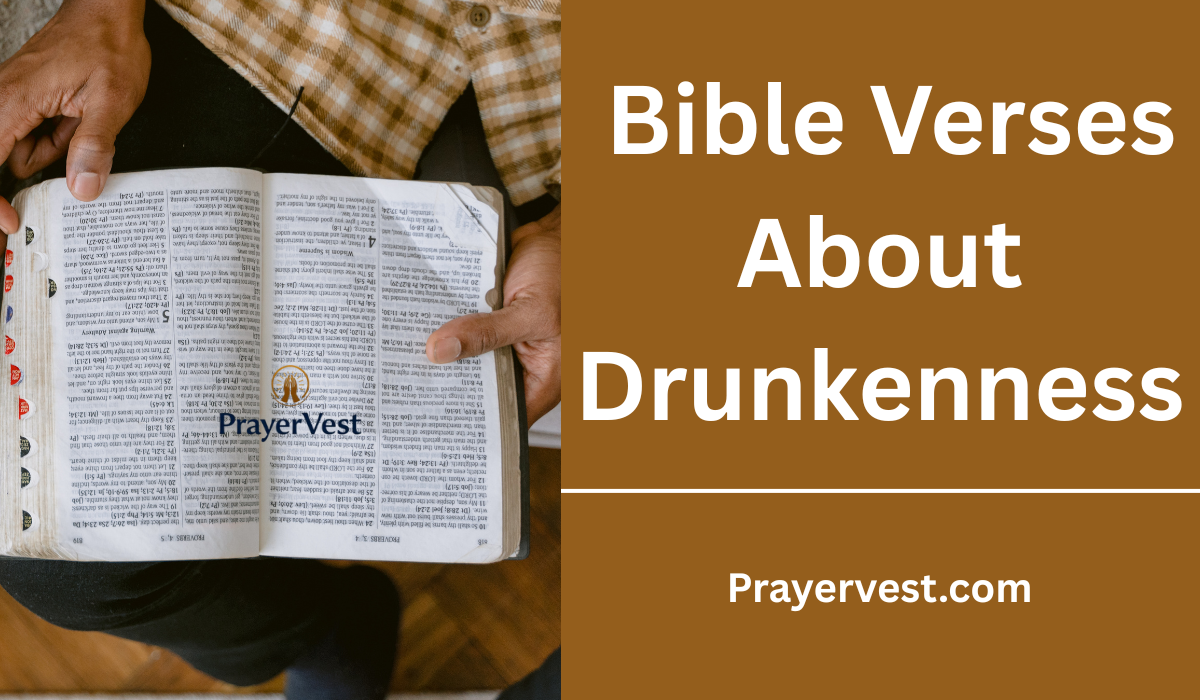The Bible takes the issue of drunkenness very seriously and warns of the harm drinking may do to one’s body and soul. Scripture firmly warns against excess and the terrible path it leads to, yet it does not prohibit the moderate enjoyment of wine or other drinks.
Intoxication impairs judgment, erodes self-control, and frequently leads to immorality, regret, and strained relationships. Believers can avoid this trap and live in the wisdom and sobriety that God wishes by following the clear instructions found in His Word.
In both the Old and New Testaments, intoxication is portrayed as detrimental and disrespectful to God. It is contrasted with the exhortation to live a blameless life, to stay vigilant, and to be filled with the Holy Spirit.
The Bible demonstrates that excessive alcohol consumption harms a person’s spiritual journey as well as their family, community, and personal testimony as a follower of Christ. These verses serve as a reminder that believers must uphold a higher standard of holiness and self-discipline.


Exploring Bible verses about drunkenness helps us understand not only God’s warnings but also His heart for our well-being. The call is not simply to abstain from excess but to embrace a life of clarity, responsibility, and peace that reflects God’s Spirit at work in us. By reflecting on these passages, we gain insight into how to guard our hearts, resist temptation, and honor God with our choices. These verses challenge us to choose self-control and spiritual fullness over the fleeting pleasure of excess.
40 Powerful Bible Verses About Drunkenness (2026)
1. Proverbs 20:1
“Wine is a mocker and beer a brawler; whoever is led astray by them is not wise.”
This proverb sets a strong foundation against drunkenness by personifying wine and strong drink as deceitful and destructive influences. It warns that those who fall under their control lose sound judgment and invite strife into their lives. The verse is a call to wisdom, urging believers to avoid the traps of excess and to remain sober-minded.
2. Ephesians 5:18
“Do not get drunk on wine, which leads to debauchery. Instead, be filled with the Spirit.”
Paul contrasts the destructive influence of drunkenness with the life-giving presence of the Holy Spirit. While drunkenness leads to reckless behavior and loss of self-control, being filled with the Spirit results in clarity, joy, and godly living. This verse highlights that true fulfillment is not found in substances but in surrender to God’s Spirit.
3. Isaiah 5:11
“Woe to those who rise early in the morning to run after their drinks, who stay up late at night till they are inflamed with wine.”
Isaiah delivers a sobering warning against those who make drinking their pursuit and priority. The verse condemns a lifestyle enslaved by alcohol, where days and nights revolve around intoxication. It shows how drunkenness dulls spiritual awareness and leads to divine judgment when one neglects God in favor of indulgence.
4. 1 Corinthians 6:10
“Nor thieves nor the greedy nor drunkards nor slanderers nor swindlers will inherit the kingdom of God.”
Paul includes drunkenness in a list of sins that hinder entrance into God’s kingdom. This is a strong reminder that habitual drunkenness is not just a personal weakness but a spiritual danger with eternal consequences. However, the broader context of this chapter also speaks of transformation—through Christ, sinners can be washed, sanctified, and justified.
5. Habakkuk 2:15
“Woe to him who gives drink to his neighbors, pouring it from the wineskin till they are drunk, so that he can gaze on their naked bodies.”
This verse not only condemns drunkenness but also the sin of leading others into it for personal gain or exploitation. It shows the destructive ripple effect alcohol abuse can cause—not only corrupting the one drinking but also ensnaring others in shameful actions. God’s warning here calls for responsibility and care in how we treat others.
6. Proverbs 23:20-21
“Do not join those who drink too much wine or gorge themselves on meat, for drunkards and gluttons become poor, and drowsiness clothes them in rags.”
This verse warns of the practical consequences of drunkenness and gluttony—poverty and ruin. It highlights how indulgence in excess not only harms the soul but also affects one’s livelihood and stability. Drunkenness leads to a lack of discipline, draining resources and leaving one vulnerable to destruction.
7. Galatians 5:19-21
“The acts of the flesh are obvious: sexual immorality, impurity and debauchery; idolatry and witchcraft; hatred, discord, jealousy, fits of rage, selfish ambition, dissensions, factions and envy; drunkenness, orgies, and the like.”
Paul identifies drunkenness as one of the destructive works of the flesh that prevent inheriting the kingdom of God. This passage emphasizes that drunkenness is not an isolated weakness but part of a larger pattern of sinful living. Believers are called to walk by the Spirit, rejecting such behaviors and embracing holiness.
8. Proverbs 23:29-30
“Who has woe? Who has sorrow? Who has strife? Who has complaints? Who has needless bruises? Who has bloodshot eyes? Those who linger over wine, who go to sample bowls of mixed wine.”
Here, Solomon paints a vivid picture of the misery that follows drunkenness—emotional pain, conflict, and physical suffering. This rhetorical series of questions highlights the destructive consequences that cling to those who remain enslaved to alcohol. The verse calls for wisdom in recognizing the bitter fruit of drunken indulgence.
9. Hosea 4:11
“Old wine and new wine take away their understanding.”
The prophet Hosea warns of the dulling effect of alcohol on spiritual discernment. Drunkenness clouds judgment, blinds the heart, and leads to poor decisions that separate people from God’s truth. This simple but powerful statement serves as a reminder that intoxication strips away wisdom and clarity.
10. Luke 21:34
“Be careful, or your hearts will be weighed down with carousing, drunkenness and the anxieties of life, and that day will close on you suddenly like a trap.”
Jesus warns His followers to remain watchful and sober-minded, for drunkenness can dull spiritual alertness and blind us to His return. This verse ties drunkenness to unpreparedness and spiritual negligence. Believers are called to vigilance, keeping their hearts free from the distractions of worldly indulgence.
11. Romans 13:13
“Let us behave decently, as in the daytime, not in carousing and drunkenness, not in sexual immorality and debauchery, not in dissension and jealousy.”
Paul exhorts believers to live in a way that reflects the light of Christ. Drunkenness is listed among behaviors that belong to darkness, which bring shame and destruction. Instead of indulging in worldly desires, Christians are called to walk in decency, purity, and self-control as a testimony to God’s holiness.
12. 1 Peter 4:3
“For you have spent enough time in the past doing what pagans choose to do—living in debauchery, lust, drunkenness, orgies, carousing and detestable idolatry.”
Peter reminds believers that their former lifestyle—marked by drunkenness and sin—should be left behind. As new creations in Christ, they are no longer bound to destructive behaviors but called to live holy lives. This verse urges Christians to break free from the past and embrace the new life God provides.
13. Proverbs 23:31-32
“Do not gaze at wine when it is red, when it sparkles in the cup, when it goes down smoothly! In the end it bites like a snake and poisons like a viper.”
This vivid imagery warns against the deceptive allure of alcohol. Though it may look attractive and pleasant, its end is painful and destructive. The proverb highlights the dangers of being captivated by appearances, reminding us that sin often masks itself in appealing forms but leads to harm and regret.
14. Isaiah 28:7
“And these also stagger from wine and reel from beer: Priests and prophets stagger from beer and are befuddled with wine; they reel from beer, they stagger when seeing visions, they stumble when rendering decisions.”
Isaiah condemns drunkenness among leaders who should have been examples of wisdom and guidance. Instead of leading with clarity and righteousness, they became clouded by alcohol, resulting in poor judgment and corruption. This verse illustrates how drunkenness not only harms individuals but also weakens communities and leadership.
15. Deuteronomy 21:20
“They shall say to the elders, ‘This son of ours is stubborn and rebellious. He will not obey us. He is a glutton and a drunkard.’”
In this passage, drunkenness is associated with rebellion, stubbornness, and disobedience. It portrays the destructive nature of excessive drinking as a sign of defiance against both parental authority and God’s commands. The verse highlights the seriousness of drunkenness as not just a personal failing but a moral and spiritual offense.
16. Micah 2:11
“If a liar and deceiver comes and says, ‘I will prophesy for you plenty of wine and beer,’ that would be just the prophet for this people!”
Micah criticizes a people who preferred false prophets promising indulgence and excess rather than God’s truth. Drunkenness is linked with deception and spiritual blindness, showing how people often choose comfort and pleasure over righteousness. This verse warns against seeking leaders who encourage sinful lifestyles.
17. Genesis 9:21
“When he drank some of its wine, he became drunk and lay uncovered inside his tent.”
This account of Noah reveals the vulnerability and shame that can result from drunkenness. After his great act of obedience in building the ark, his lapse into drunkenness brought dishonor and family conflict. The verse reminds us that even righteous individuals can fall when they lose self-control.
18. Leviticus 10:9
“You and your sons are not to drink wine or other fermented drink whenever you go into the tent of meeting, or you will die. This is a lasting ordinance for the generations to come.”
God commanded the priests to remain sober while serving in the tabernacle. Drunkenness would compromise their ability to minister with holiness and discernment. This verse highlights the importance of sobriety in worship and service, showing that reverence for God requires clear minds and pure hearts.
19. Judges 13:4
“Now see to it that you drink no wine or other fermented drink and that you do not eat anything unclean.”
This command was given to Samson’s mother before his birth, emphasizing the importance of purity and abstinence in fulfilling God’s calling. Avoiding alcohol symbolized dedication and separation unto the Lord. The verse shows that drunkenness is incompatible with a life consecrated to God’s purposes.
20. 1 Samuel 1:14-15
“Eli said to her, ‘How long are you going to stay drunk? Put away your wine.’ ‘Not so, my lord,’ Hannah replied, ‘I am a woman who is deeply troubled. I have not been drinking wine or beer; I was pouring out my soul to the Lord.’”
Hannah’s encounter with Eli shows how drunkenness was common enough to be mistaken for genuine spiritual expression. Yet her devotion stood in contrast—she was not intoxicated but fervently praying. This verse highlights the difference between spiritual surrender and drunken behavior, calling believers to true worship over indulgence.
21. 2 Samuel 11:13
“At David’s invitation, he ate and drank with him, and David made him drunk. But in the evening Uriah went out to sleep on his mat among his master’s servants; he did not go home.”
David attempted to use drunkenness to manipulate Uriah, hoping he would go home to his wife and cover David’s sin. Yet even in his drunken state, Uriah showed loyalty and discipline. This verse warns how alcohol can be misused to weaken integrity and how sin often exploits drunkenness to achieve its ends.
22. Esther 1:10
“On the seventh day, when King Xerxes was in high spirits from wine, he commanded the seven eunuchs who served him…”
King Xerxes’ drunkenness led to rash decisions that dishonored his queen and disrupted his household. This verse shows how alcohol clouds judgment, leading to poor leadership and regrettable choices. Drunkenness here becomes a gateway to pride and foolishness, affecting not only the individual but an entire kingdom.
23. Psalm 107:27
“They reeled and staggered like drunkards; they were at their wits’ end.”
This verse uses the imagery of drunken staggering to describe those overwhelmed by life’s storms. It portrays the instability and helplessness associated with drunkenness. Spiritually, it reminds us that without God’s guidance, we are tossed about, lacking direction and strength.
24. Proverbs 26:9
“Like a thornbush in a drunkard’s hand is a proverb in the mouth of a fool.”
This proverb compares the misuse of wisdom to a drunkard holding a thornbush—dangerous and destructive. A drunkard cannot handle something sharp without harm, just as a fool cannot wield wisdom rightly. The verse highlights how drunkenness strips a person of discernment, leaving them reckless with truth.
25. Isaiah 19:14
“The Lord has poured into them a spirit of dizziness; they make Egypt stagger in all that they do, as a drunkard staggers around in his vomit.”
Here drunkenness is used as an image of national confusion and disorder. Just as a drunkard stumbles in shame, Egypt was left staggering without clarity or direction. This verse illustrates how sin and rebellion against God bring instability and disgrace, much like the effects of intoxication.
26. Jeremiah 13:13
“Then tell them, ‘This is what the Lord says: I am going to fill with drunkenness all who live in this land—including the kings who sit on David’s throne, the priests, the prophets and all those living in Jerusalem.’”
God uses drunkenness as a metaphor for judgment, symbolizing confusion, weakness, and downfall. When leaders and people reject God’s word, they lose clarity and stumble into destruction. This verse shows that drunkenness is not only a physical danger but also a symbol of spiritual rebellion and its consequences.
27. Lamentations 4:21
“Rejoice and be glad, Daughter Edom, you who live in the land of Uz. But to you also the cup will be passed; you will be drunk and stripped bare.”
The prophet uses drunkenness as an image of God’s judgment. The “cup” represents divine wrath, leaving Edom vulnerable and disgraced. Just as drunkenness exposes weakness and shame, so too does rebellion against God leave a nation exposed to His justice.
28. Nahum 1:10
“They will be entangled among thorns and drunk from their wine; they will be consumed like dry stubble.”
Drunkenness is here connected with destruction. The enemies of God’s people are pictured as drunk and careless, unable to resist when judgment comes. Their false sense of security through indulgence leads only to sudden ruin.
29. Matthew 24:49
“And he then begins to beat his fellow servants and to eat and drink with drunkards.”
Jesus describes a wicked servant who abuses his authority and indulges in drunkenness instead of being faithful. This verse shows how drunkenness is tied to neglect of responsibility and mistreatment of others. It is a warning against complacency and sinful living while waiting for Christ’s return.
30. Acts 2:15
“These people are not drunk, as you suppose. It’s only nine in the morning!”
On the day of Pentecost, some accused the disciples of drunkenness when they were filled with the Holy Spirit. Peter clarified that what was happening was not drunkenness but the power of God at work. This contrast highlights the difference between being controlled by alcohol and being filled with God’s Spirit.
31. Job 12:25
“They grope in darkness with no light; he makes them stagger like drunkards.”
Job describes those deprived of wisdom as staggering like drunkards, lost in confusion and unable to find their way. Drunkenness here symbolizes spiritual blindness and helplessness. It reminds us that apart from God’s guidance, people are left stumbling without direction.
32. Psalm 75:8
“In the hand of the Lord is a cup full of foaming wine mixed with spices; he pours it out, and all the wicked of the earth drink it down to its very dregs.”
The psalmist uses the imagery of a cup of wine to represent God’s judgment. The wicked, like drunkards, are forced to drink it fully, experiencing the consequences of their rebellion. Drunkenness here becomes a picture of divine wrath poured out on unrepentant sin.
33. Proverbs 4:17
“They eat the bread of wickedness and drink the wine of violence.”
This verse links wine with violence, showing how indulgence in sin leads to destructive behavior. Just as drunkenness can stir anger and strife, so too does a life devoted to evil harm others. The proverb warns against joining those whose pleasures are rooted in sin and destruction.
34. Jeremiah 25:27
“Then tell them, ‘This is what the Lord Almighty, the God of Israel, says: Drink, get drunk and vomit, and fall to rise no more because of the sword I will send among you.’”
God instructs Jeremiah to describe judgment as drunkenness leading to ruin. Here, drunkenness represents helplessness and collapse under the weight of God’s wrath. The imagery emphasizes the severity of divine judgment against persistent rebellion.
35. Joel 1:5
“Wake up, you drunkards, and weep! Wail, all you drinkers of wine; wail because of the new wine, for it has been snatched from your lips.”
Joel calls drunkards to awaken and recognize the devastation of judgment. Their indulgence has left them vulnerable, and now their pleasures are taken away. The verse is both a rebuke and a call to repentance, urging them to see the futility of excess.
36. Obadiah 1:16
“Just as you drank on my holy hill, so all the nations will drink continually; they will drink and drink and be as if they had never been.”
Drunkenness is again used as a metaphor for judgment. Nations that opposed God’s people would drink the cup of His wrath until they were destroyed. The verse warns that indulgence in sin and rebellion ultimately leads to complete downfall.
37. Matthew 11:19
“The Son of Man came eating and drinking, and they say, ‘Here is a glutton and a drunkard, a friend of tax collectors and sinners.’ But wisdom is proved right by her deeds.”
Jesus was falsely accused of being a drunkard because of His association with sinners. This verse shows how people often misinterpret godly behavior through a worldly lens. It reminds us that character is not defined by accusations but by the fruit of one’s life.
38. Luke 12:45
“But suppose the servant says to himself, ‘My master is taking a long time in coming,’ and he then begins to beat the other servants, both men and women, and to eat and drink and get drunk.”
Jesus warns against servants who use delay as an excuse for sin, including drunkenness. Instead of remaining faithful, they indulge in excess and mistreat others. The verse highlights drunkenness as a symbol of unfaithfulness and neglect of responsibility.
39. 1 Thessalonians 5:7
“For those who sleep, sleep at night, and those who get drunk, get drunk at night.”
Paul contrasts darkness and light, drunkenness and sobriety. Drunkenness is associated with night and spiritual darkness, while believers are called to live as children of the day. This verse emphasizes the need for watchfulness and self-control in the Christian life.
40. Revelation 17:2
“With her the kings of the earth committed adultery, and the inhabitants of the earth were intoxicated with the wine of her adulteries.”
In Revelation, drunkenness symbolizes spiritual corruption and compromise with evil. The imagery shows how entire nations can become intoxicated by sin and deception. It serves as a warning against being lured by worldly pleasures that draw hearts away from God.
Conclusion
The Bible’s stance on intoxication is ultimately unambiguous and unchangeable. God forbids it not to stifle happiness but to shield us from the perils of excess and the suffering it causes in our relationships and lives. While sobriety provides clarity, calm, and spiritual development, drunkenness results in bad judgment, susceptibility to sin, and a broken relationship with God. These verses demonstrate God’s profound concern for our welfare and His exhortation to live sensibly, honoring Him with our bodies and decisions.
Deciding to abstain from alcohol is a sign of faith and loyalty to Christ, not just a question of self-control. To walk in holiness, vigor, and clear judgment, believers are called to be filled by the Spirit rather than wine. By adopting God’s knowledge, we serve as shining examples of His transformative grace in addition to protecting ourselves from danger. These verses serve as a reminder that the real contentment we seek can only be found in God’s presence, which brings us joy, serenity, and enduring fulfillment.






